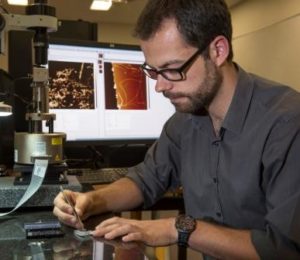 High-tech, thin film gadgets – including smartphones, tablets and interactive TVs – are being used by a growing number of households worldwide.
High-tech, thin film gadgets – including smartphones, tablets and interactive TVs – are being used by a growing number of households worldwide.
With the rise of South Australia’s own advanced manufacturing industry, a Flinders University researcher is now undertaking a project that aims to improve the quality, reliability and efficiency of emerging technologies.
Dr Andrew Stapleton, a Postdoctoral Research Fellow in the Flinders Centre for NanoScale Science and Technology, has just received $30,000 from the State Government’s Catalyst Research Grants Program to enhance the resolution of images from atomic force microscopes using cutting-edge nanotechnologies.
By improving the resolution and reliability of these powerful instruments, any manufacturing faults in new devices will become clearer under the microscope, paving the way for upgrades and improvements to future models.
“The Peak Force Tunnelling Atomic Force Microscopy (PF-TUNA) is one of only two instruments in Australia and it measures the height profile of high-tech materials on a nanoscale, including their electrical conductivity,” Dr Stapleton said.
“Many emerging technologies, such as solar cells, work with electricity flowing through them but the quality of these technologies relies on the efficiency of the electrical conduction at interfaces within the device,” he said.
“If we can better understand the nanoscale surface conductivity of these materials and look for defaults we can essentially make them better.”
Using custom-made, single-walled carbon nanotube probes, Dr Stapleton said he aimed to enhance the resolution of the atomic force microscope “so that it can see smaller and smaller things”.
“Single-walled nanotubes have a tip of about two nanometres, which is about 50,000 times smaller than the width of a human hair, which means we’re going to be able to resolve smaller defects in devices, both during production and post-mortem.
“Advanced manufacturing of thin film devices and small electronics will increase rapidly over the coming years with demand for low energy, easily recyclable devices so it’s hoped our technology will help improve the quality of devices manufactured in SA, and support the growing local industry.”
The project is industrially supported by Bruker Corporation – an international manufacturer of scientific instruments for molecular and materials research.
Flinders Senior Research Associate Dr Egon Perilli from the School of Computer Science, Engineering and Mathematics was also awarded a Catalyst grant to develop innovative methods of detecting osteoarthritis at the onset to prolong the life of the affected joint, before and after surgery.
If successful, the project could lead to increasingly targeted and successful treatments, as well as custom-designed orthopaedic implants.
Dr Perilli and Dr Stapleton were two of four recipients of the Catalyst program, an initiative which aims to support early career researchers involved in scientific and technological research.

